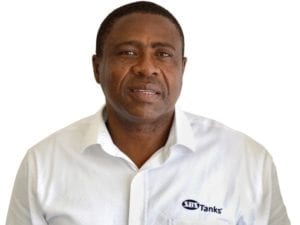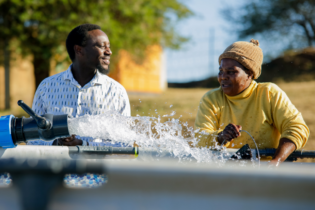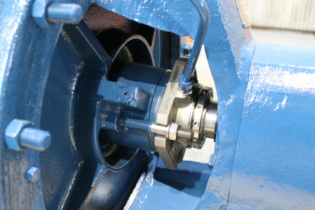For the past 20 years, SBS, has been actively contributing to South Africa’s water security with its range of Zincalume® water storage reservoirs.
Mava Gwagwa, new business and key accounts director, SBS Tanks, discusses how access to water shapes a positive future.How is your traditional market base evolving?
MG We face many challenges as a country in terms of food and water security. In response, SBS has positioned itself to cater for both areas, responding to the needs of communities and industries. We regard agriculture as a key growth sector serving both formal and informal farming initiatives. In response, SBS has developed bespoke wet and dry storage solutions. These include a complete range of silos, conveying and drying equipment for the storage and processing of grain.What is SBS Tanks’ past experience with rural farming communities?
The key requirement for every cultivating activity is a sustained water supply, which we cover with our tank solutions. We’ve also responded on the dry storage side, with an innovation that overcomes the lack of access to mechanisation and capex – post-harvest losses due to inefficient grain storage are a major problem. SBS Agri has developed a range of mechanical-pulley-driven grain storage hoppers for rural farming communities, which do not require electricity to operate.How is SBS responding to drought alleviation initiatives?
A recent project entailed the installation of our tanks for a desalination plant in Cape Town. These were designed and commissioned in conjunction with Quality Filtration Systems to supply the Cape Town International Convention Centre with all its potable water requirements. For this particular project, three different tanks were installed to meet the various stages of the reverse osmosis and filtration process. Together, they provide a total of 436 000 litres of water storage.Is SBS working with municipalities and government agencies to find workable solutions to the infrastructure backlog?
Yes, SBS assists in eradicating water supply backlogs and fast-tracking service delivery. The economic climate has made it necessary to focus on reprioritising existing resources towards areas where the most value can be derived for all South Africans. Budget discussions take place with function groups that are made up of various institutions across the three spheres of government. These are strategically grouped to facilitate subject-specific discussions, targeting service delivery. By way of example, for Mandela Day 2018, SBS partnered with Salga KwaZulu-Natal to donate a tank to Mandlenkosi Primary School in Greytown. Pupils previously had to collect water from a nearby river.What about opportunities for reuse?
Due to climate and environmental changes, treated wastewater has many downstream benefits. These include the irrigation of crops. If we look at the pig farming industry, for example, manure from the animals is pumped into anaerobic ponds and the solids removed. The wastewater is then used for irrigation purposes. Building roofs in general also presents excellent opportunities for rainwater harvesting. The watercaptured is treated and stored in SBS’s purpose-built range of reservoirs for downstream applications.
Does Zincalume offer unique benefits?
Yes, definitely. The prefabricated Zincalume methodology helps fast-track conveyance and installation. Zincalume panels consistently prove to be the superior choice, as they are lighter and easier to work with. These tanks are:- strong and resistant to damage caused by storms, wind and lightning
- robust and easy to repair
- sustainable, being 100% recyclable
- environmentally friendly – water is not exposed to unhygienic conditions
- easy to repair and maintain.
Because of their modular design, these tanks are easy to transport to site, especially in remote locations. For example, SBS has supplied drinking water tanks to a yoga resort on a Greek island. The tanks were transported over a number of trips via small boat from the mainland.
You don’t need to construct infrastructure like roads to access the build location, as would be the case with typical concrete reservoirs. Additionally, SBS’s reservoirs are installed utilising a jacking system from ground level, which means there is no need for scaffolding orcranes on-site.
Are there opportunities for SMME development?
Government has prioritised entrepreneurship and the advancement of SMME businesses as the catalyst to achieving economic growth and development. SBS’s systems are a good match for small and medium-sized contractors due to the low establishment costs. For our large tanks, a simple concrete ring beam base forms the foundation. SBS has a database of preferred suppliers, which are provided with in-depth training, project management and quality control support. It is mandatory for all suppliers to comply with SBS policies and procedures, specifications and standards.What’s the typical lifespan of an SBS tank?
Due to the high-quality Zincalume material employed and our world-class engineering processes, SBS Tanks are designed and engineered to have a lifespan of 60+ years under normal climatic and operating conditions. Our tanks also carry a 12-month workmanship and materials guarantee. In addition, a 10-year non-leak warranty is applicable, provided the tank is installed by an approved SBS installer.How is SBS making a difference in terms of its own social responsibility initiatives?
The SBS vision is to build long-term partnerships by having continuous contact with our communities. We are achieving this through repeated brand exposure and shared PR opportunities, such as our upcoming ‘Build forBetter’ campaign. We believe strongly in nation-building: the belief that we all have a role to play in lifting our communities, our lives, and our country for the benefit of all. Our aim is to highlight the great stories that emanate from ordinary South Africans, be it through entrepreneurial efforts, community efforts or even a single act
of kindness. Other more traditional CSI projects we participate in include our annual cold drink donations. We sell cold drinks to staff throughout the year and the revenue collected is shared among local organisations at our annual Employee Appreciation Day. We’re excited about our latest partnership with KwaCutswayo Primary School. This will see us donating toys for the grade R learners. These toys are made at a workshop within our office park. Members of staff have volunteered their time to assist in making them. The school is within 7 km of our factory and, therefore, a part of our community. We have a number of other programmes we are embarking on, which include starting our own vegetable garden. Wherever possible, this garden will be irrigated via rainwater harvesting.






